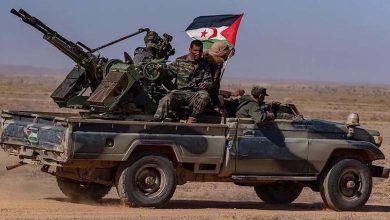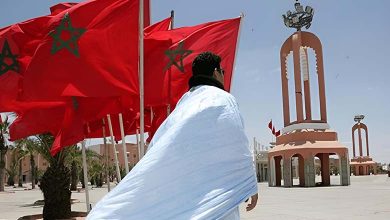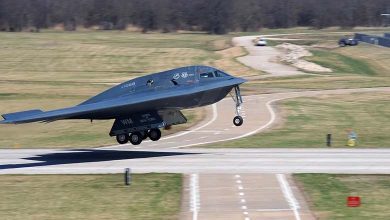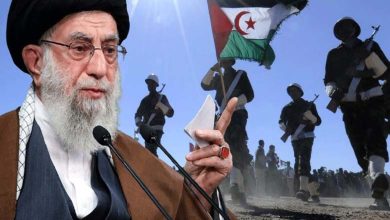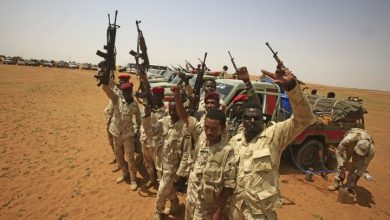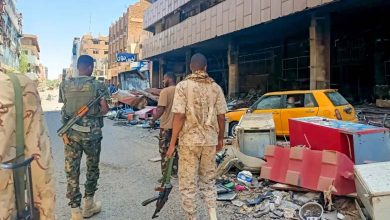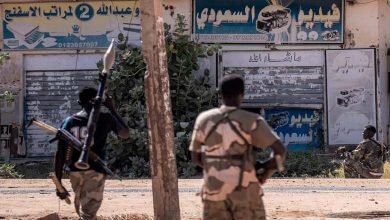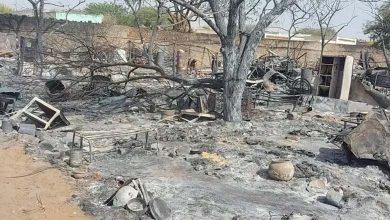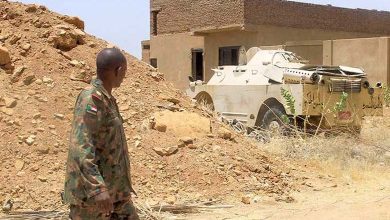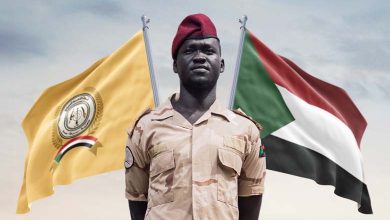Tehran in Sudan: Western concerns about the emergence of Sudanese Popular Mobilization Forces
Sudan's relations with foreign armed groups have not been completely severed
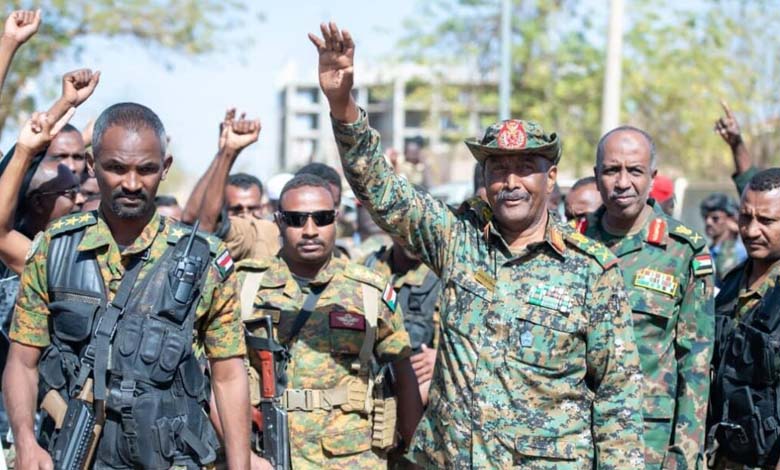
After a video surfaced showing members of the Rapid Support Forces carrying debris from one of these Iranian-made drones, fears have arisen about the return of the former Sudanese regime with all its details to the Sudanese scene, along with its former allies who were the cause of Sudan’s international isolation and its placement on the list of UN and international sanctions for three decades.
Bloomberg reported that Iran is supplying the Sudanese army with shipments of Iranian weapons and drones of the “Mohajer 6” model manufactured in Iran. This demonstrates Iran’s interest in Sudan, whose maritime borders extend for about 670 km, and by controlling Sudanese ports, Iran and its allies will gain a foothold in a highly important trade route near Yemen, Saudi Arabia, and Israel.
The army has made progress in battles in Omdurman and Khartoum Bahri after receiving new weapons “from an unspecified source,” which caused a change in its military and political strategy and marked a turning point in the war. In a speech to officers and soldiers of the 11th Infantry Division in Khashm Al-Girba, eastern Sudan, Al-Burhan called on the army and allied armed groups to launch a wide-ranging attack against the Rapid Support Forces, with the aim of driving them out of all areas they control.
This change came after the army followed a strategy of self-defense instead of attacking the Rapid Support Forces for some time. In the context of political solutions and negotiations to end the war, Al-Burhan emphasized in a speech in Kassala the need for these negotiations to take place within Sudan itself and that they cannot be conducted by traveling to meet any foreign party, referring to the planned meeting with the coordinator of the Civil Democratic Forces “Taqadum” Abdullah Hamdok, stating that the initiative of the East African Development Government “Igad” does not represent the will of the Sudanese people or interfere with Sudanese affairs. He said, “No external party will impose solutions on us.”
With the war continuing and no solution in sight, international interventions seeking their interests in Sudan have increased, betting on various factions to gain more influence in a troubled country. The domination of the axis of the Islamic Movement “Kizan” has become stronger, especially after the suspension of the Jeddah platform and the cessation of negotiations to end the war and Sudan’s rejection of the Igad initiative, which he described as “biased” in favor of the Rapid Support Forces and their commander, General Mohamed Hamdan Dagalo.
Chief of Staff General Abdul Fattah al-Burhan, who has made the eastern part of the country his capital, particularly in Port Sudan on the Red Sea, is accused of being supported by the group of the former Omar al-Bashir regime and its Islamic leaders and of being the mastermind of the war. This group, called “Kizan,” still maintains ties with Iran and its supporters, especially Hassan al-Turabi, the former party leader.
Historically, there has always been a strong relationship between the Sudanese Kizan and other Islamic organizations in the region such as Hamas, Al-Qaeda, and Hezbollah, and in the past, the relationship was close between Iran and Sudan, which was under the rule of the Sudanese Islamic Movement led by Turabi and President al-Bashir since 1989, and this relationship continued until January 2016 when it was publicly interrupted due to the storming of the Saudi embassy in Tehran. Now, after the settlement between Riyadh and Tehran, these tensions have subsided, and relations based on interests between Iran and its traditional partners in Sudan have been restored.
In fact, the possibility of continuing this relationship unofficially persists even in times of tension, as many members of the Islamic Movement have contacts outside Sudan, including with Qatar and Iran, even during the period of cooling relations between Tehran and Khartoum. Recently, Egyptian authorities arrested businessman Abdel Basit Hamza in Cairo, who is close to former Sudanese President Omar al-Bashir and his party. The US State Department confirmed that Hamza is classified as a global terrorist and pointed out that he provided financial support to Hamas of about $20 million, indicating that Sudan’s relations with foreign armed groups have not been completely severed.
In a move many consider a revival of old relations, a statement was issued by the Sudanese government in October 2023, stating that the two states, Iran and Sudan, “discussed the restoration of bilateral relations between the two countries and expedited steps to reopen their embassies.” Media outlets reported that “Tehran received a promise from figures affiliated with the Islamic Movement to cooperate with it and facilitate extending its influence in the Red Sea if it provides generous military support to help it withstand the war.”
What makes the future in this case even darker is Sudan’s history, which hosted extremists and jihadists from both extremes, as the Sudanese regime period witnessed the presence of Osama bin Laden, the leader of Al-Qaeda, Hamas, Hezbollah, and Carlos the Jackal. This was the reason Sudan was placed on the list of states supporting terrorism.
Comparing the existing scenarios in the region, and in other places where Iranian influence has expanded, fears arise here about the transformation of the Sudanese Islamic army’s allegiance into a militia similar to the Iraqi Popular Mobilization Forces, obeying its commander internally and externally to Iran, the source of funding and military support. These fears increase especially after calls from the Sudanese army to arm civilians and organize them “for popular resistance” and open the door for individuals to buy weapons.
The stronghold of the Sudanese army in the east is the most vulnerable area to Iranian expansion, as the presence of Beja and its support for the Islamic movement and the army are among the main factors making Port Sudan a comfortable place and a good starting point for controlling the port. The head of the Higher Council of Beja Tribes Watch and Independent Columns, Mohamed Al-Amin Turk, is a member of the National Congress Party and the Islamic Movement, and he is currently one of the supporters of the Sudanese army and Lieutenant General Abdel Fattah Al-Burhan.
The Beja tribes, in eastern Sudan, faced neglect and disregard for their legitimate demands under the rule of ousted President Omar al-Bashir, such as economic reform and political representation in the eastern region. They have become a prominent challenge facing the transitional government after the overthrow of al-Bashir, even before the conflict between the army and the Rapid Support Forces erupted. The tribes once again confirmed their lack of effective representation in the transitional governance institutions.
Mohamed Al-Amin Turk, head of the “Higher Council for Surveillance and Columns of Beja Tribes,” led several tribes in eastern Sudan who reject the peace process in the Juba Agreement, which took place between the previous transitional government and armed movements. The rejection was due to their marginalization and the selection of parties that do not represent the region for negotiation. Those tribes threatened to establish the Beja state in the east, as the council announced its intention to “declare the Beja state,” accompanied by a new timetable for closing a lawsuit in eastern Sudan.
The conflict between the east and the center has escalated more than once with the closure of Port Sudan and the road to Khartoum. Moreover, the council closed the port in September 2022 in protest against the internationally supported “Framework Agreement” signed between the Central Council for Freedom and Change “FFC” and the military component, accusing the government of misrepresentation and neglect of their demands.
In addition to Beja, there are a number of military factions affiliated with the army with an Islamic character. For example, the Special Forces, which are part of the army, consist of intelligence, shock, and special forces units, and active Islamic coalitions in areas such as Kassala state and Khartoum, where they post pictures on social media showing their presence in Omdurman and executing operations in Shendi, north of Khartoum. Several factions, such as the Sudanese Popular Resistance in the Red Sea state, participate in the political momentum that brings together military and political leaders with the same Islamic interest. They emphasize the readiness of the reserve forces and the mobilized to work in various areas, focusing on protecting the eastern gateway.
Whether Sudan’s situation is a repetition of scenarios that occurred in the region or a different scenario from its predecessors, it is important to know that the presence of extremist military groups in Sudan and the enhancement of their status will not only stop affecting within its borders but will be a point from which the surroundings will be affected.


